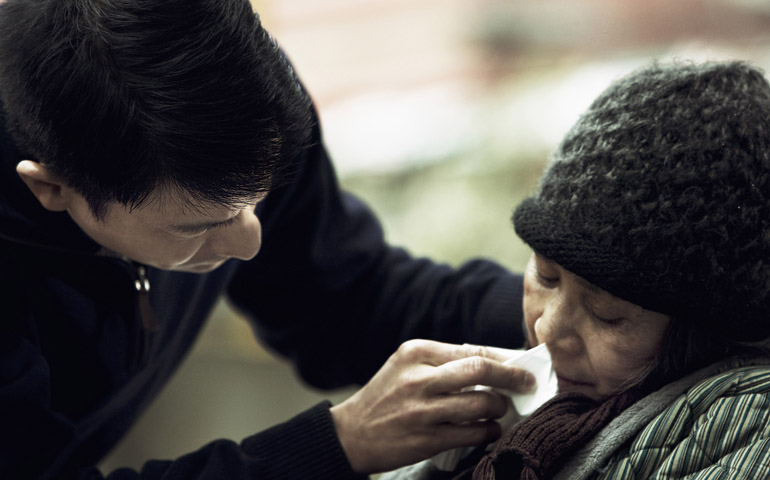
Andy Lau and Deanie Ip in "A Simple Life" (China Lion Entertainment)
A purpose-driven expression etched on her face, an elderly lady known as Ah Tao makes her way through the Hong Kong street market. In her left hand is a basketful of fresh produce, in her right, a plastic bag bearing live fish.
As she reaches a vegetable stall, the vendors anticipate her arrival with amusement. They welcome her warmly and ask her what she needs. "Garlic," she responds. Obviously a regular, she dons a coat, puts on a pair of prescription eyeglasses, and enters the walk-in refrigerator. Like a seasoned chef out shopping for premium ingredients, she meticulously examines pieces of peeled garlic and puts the chosen few in a bag.
Ah Tao is a Hong Kong amah, a stay-in domestic servant, who has been in the service of a Chinese family for more than 60 years. Today, she only serves the middle-aged bachelor Roger, the sole family member who has not migrated to the United States.
At the dining room of Roger's compact apartment, a special, multicourse seafood lunch awaits him, but his expressionless face indicates that this is nothing outside of the ordinary. Mechanically, he puts out his hand, knowing that Ah Tao will be ready to serve him a bowl of rice. He wolfs down the meal but offers neither affirmation, nor simple thanks, to the cook who went through great lengths to prepare it. The only words he utters before he leaves for work are, "I haven't had ox tongue in a while."
Lensed by veteran Hong Kong director Ann Hui, the aptly titled "A Simple Life" is based on the true story of film producer Roger Lee and his family's amah, Chung Chun-Tao. Hui ferries the material from real to reel by way of straightforward storytelling, unforced character development, and emotional restraint.
The predictable routine of everyday life is disrupted when, without warning, Ah Tao suffers a stroke. Not wanting to be a burden, she makes a firm decision to move into an assisted-living home.
If adversity reveals a person's true character, the personal tragedy that befalls Ah Tao awakens Roger's sensitive side, which was normally belied by his apparent self-absorption and stoic veneer.
Realizing Ah Tao's significant place in his life and the impending void of her absence, Roger extends care and support to the woman who had helped raise him from infancy. Visiting her regularly as her "godson," he makes sure her accommodations are satisfactory, spends time in conversation with her, and takes her to restaurant meals. In their times together, the two find solace in the simple cadence of their renegotiated routine.
The film eschews the melodramatic conventions that Hollywood often resorts to given intimate dramas of this sort -- no shedding of copious tears, no hugging, no deathless lines. The care and affection between the two leads are inflected in small, tender gestures during unguarded moments. In one light-hearted scene, Ah Tao and Roger tease each other about their old crushes with a mischievous fondness not unlike kids at play. In another scene, they rummage through Ah Tao's collection of keepsakes, happily rekindling the precious memories they've shared.
The understated sentiment is made more eloquent by the calibrated performances of the actors, most especially Deanie Ip, who so thoroughly disappears into the role of Ah Tao that her moments infuse the film with a documentary feel. She deservingly reaped acting honors for this role from prestigious film festivals, including the Venice International Film Festival's Volpi Cup in 2011.
Asian pop icon Andy Lau is also convincing in his role: His Roger is an enigmatic blend of unsentimentality and heartfelt sensitivity. Having portrayed mother and son in films before, Ip and Lau share a special chemistry that translates beautifully onscreen; their relationship feels authentic.
A number of the film's bright moments take place in the home for the elderly where Ah Tao adjusts to her new living situation and develops meaningful connections. Her transition is not instant, but her natural sensitivity and care for others soon give her a sense of purpose in her new home. She becomes a gracious peacemaker and a generous friend to her housemates as they deal with the harsh realities of their own lives. When an older lady resident has a spat with her visiting daughter, it is Ah Tao's gentle encouragement that softens her heart so that reconciliation becomes possible. In turn, her new friends offer her the warmth and companionship that she needs.
When Ah Tao's health begins to show signs of progressive deterioration, mortality and the hereafter are realities she and Roger have to face. They do so with a quiet dignity and a serene acceptance. It is only in this latter portion of the film that we are allowed to gain some insight on where the character's centeredness might be rooted -- Ah Tao and Roger are Christians. Lying on a hospital bed, and in the company of Roger and a visiting pastor, Ah Tao has the chance to reflect on the meaning of her life through the eyes of faith.
When the pastor quotes the well-known passage from the book of Ecclesiastes -- "To everything there is a season ... a time for tears and a time for laughter ... " -- Roger and Ah Tao attach their own humorously irreverent lines to it.
"A time for surgery and bile duct dissection," Roger adds teasingly.
"A time for steaming melons, and a time for salted eggs," Ah Tao interjects, half-grimacing in pain through fits of laughter.
It is this paradoxical admixture of light and shade that makes "A Simple Life" such a rewarding viewing experience. At once funny and moving, joyful and melancholic, the film is a truthful portrait of the profound ebb and flow of human life.
An adage from the Spanish church doctor and mystic St. Teresa of Avila meaningfully resonates with Ah Tao's simple life of dedicated service: Entre los pucheros anda el señor -- "God walks among the pots and pans." As can be drawn from the film's title, "A Simple Life" invites viewers to contemplate the delicate turns of grace in the very ordinariness of life. Here, grace does not so much enter into the picture in the dramatic form of a burning bush as it does small servings of manna, the blessings of a life lived one day at a time. A simple life is, quite simply, a gift.
[Precious Blood Br. Antonio D. Sison is author of the book World Cinema, Theology, and the Human (2012), and a faculty member at Catholic Theological Union in Chicago. "A Simple Life" is available on DVD and Blu-ray from Well Go USA Entertainment.]



